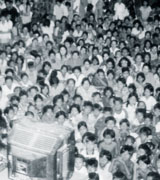HIV prevention among migrant communities in Cambodia and Thailand
More than 700 villagers crowd around an old television propped up in the back of a truck parked in the middle of the road. The farming families of Prey Veng Province, Cambodia, have gathered to watch No Home Too Far. This feature-length film produced by PATH is helping prevent the spread of HIV and AIDS in Cambodia and Thailand, where HIV rates are high in part owing to the movement of migrant workers within Asia.
Reflections on reality

Villagers crowd around a TV to watch the film.
“Watch! It’s true! It was just like that! I won’t go back again,” one Cambodian villager exclaims to the audience. In the movie, a young man’s family sells their pigs to pay for his passage to Thailand. They hope he finds work there—and can earn enough money to improve the family’s lot.
Chet endures the journey to a fishing village in Thailand, where he faces dangerous working conditions, discrimination, homesickness, illness, and new temptations, such as drinking and prostitution. Left behind in Cambodia, Chet’s wife copes with her first pregnancy alone.
As the villager’s comments suggest, the movie reflects real life. In some cases, it is the only information that potential migrants get, apart from what paid agents who help them cross the border say. These paid agents may not have migrants’ best interests at heart.
The movie isn’t meant to stop people from migrating, but to give them the information they need to protect themselves and make good decisions. One man said that, although he had planned to leave in the morning, the movie helped him decide not to go. Others choose to go, and they travel with a new awareness of the risks they face.
Connections across borders
For communities of Cambodians already in Thailand, the film dispels myths about HIV and clearly shows the effects of choices they make every day. It also reminds migrant workers of home and the loved ones awaiting their return. “That’s important,” says Pawana Wienrawee, PATH’s technical director in Thailand, “because the more cut off migrants are from their home village, the more likely they are to fall into bad habits.” Many of the migrants are young, away from home for the first time, and susceptible to peer pressure.
To help migrants maintain connections to home, PATH set up a system for exchanging postcards between the Cambodia and Thailand communities, which are separated not just by distance, but by the lack of reliable mail delivery and the transience of the migrants.
Project staff in Cambodia help families write greetings on postcards that depict rural Cambodia and the message “Miss you very much; send news back!” The postcards that workers send back from Thailand show fishing boats and piers, with the message “Working for our family.” Migrant workers use the postcards to assure their families that they are safe.
Entertainment that educates
The postcards and No Home Too Far are powerful, culturally appropriate ways of helping migrants and their families avert risk. The postcards help families stay in touch and mindful of the life they are trying to build. The movie entertains as it educates, provoking lively discussions at both ends of the migration route about the pros and cons of migration and ways people can protect themselves from HIV and AIDS.
So far, nearly 60,000 people in villages and worker communities have seen the movie at one of 180 showings. “Mothers, fathers, and grandparents, wives, husbands, and children—they all watch and talk about the movie,” says PATH’s Cambodia project officer Samith Hou. “It moves so many people.”
Photo: David Hipgrave.
Adapted with permission from the PATH website, February 2009.